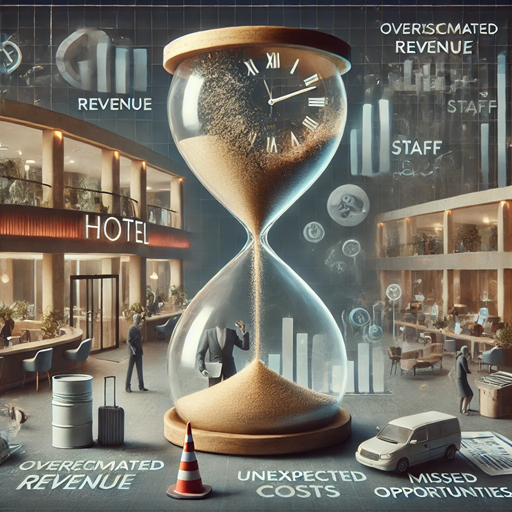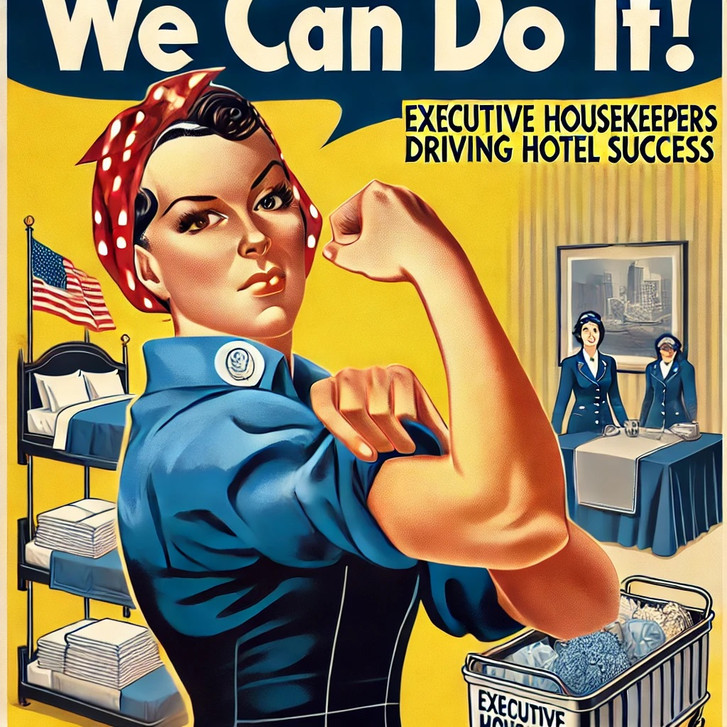Abstract
In the competitive hospitality industry, owner-operators must ensure every department contributes effectively to the hotel's financial success. This article delves into the critical role of the executive housekeeper in formulating and executing the hotel's operating budget. We explore how the operating budget functions as both a financial plan and a guide for operational efficiency. By examining the executive housekeeper's dual responsibilities—budget planning and expense management—we highlight strategies to achieve financial goals while maintaining high service standards. Flexibility in budget management and the importance of monitoring expenses are emphasized to help owner-operators do things correctly and sustainably.
Introduction
As an owner-operator in the hotel industry, you understand that effective financial management is the backbone of your property's success. One crucial, yet sometimes overlooked, aspect is the role of the executive housekeeper in managing the hotel's operating budget. Not only does the operating budget outline your financial goals by relating operational costs to expected revenues, but it also serves as a roadmap for achieving these objectives.
In this article, we'll shed light on how the executive housekeeper contributes significantly to your hotel's financial health. By integrating strategic planning with diligent expense management, they ensure that the housekeeping department not only runs smoothly but also aligns with your overarching financial goals.
Understanding the Operating Budget: A Plan and a Guide
What is an Operating Budget?
An operating budget is a financial plan that projects both anticipated revenues and the expenses required to generate those revenues over a specific period, typically a fiscal year. For hotels, this budget is often broken down monthly and allocated across various departments, including housekeeping.
The Dual Purpose of the Budget
- As a Financial Plan
- Strategic Forecasting: It sets financial expectations, outlining projected income based on expected occupancy rates and room sales.
- Resource Allocation: It determines how funds are distributed across departments to achieve these revenue targets.
- As an Operational Guide
- Performance Benchmarking: Provides metrics for departments to measure success and efficiency.
- Flexibility for Adjustments: Allows for modifications in response to market fluctuations, such as changes in occupancy rates or unexpected expenses.
The Executive Housekeeper's Dual Responsibilities
1. Active Participation in Budget Planning
Your executive housekeeper plays a pivotal role in the planning phase of the budget by:
- Forecasting Departmental Expenses: Collaborating with the rooms division manager and general manager to predict housekeeping costs based on projected room occupancy.
- Identifying Cost-Saving Opportunities: Proposing efficient practices and technologies that can reduce expenses without compromising quality.
- Aligning with Hotel Goals: Ensuring that the housekeeping budget supports the hotel's overall financial objectives and guest satisfaction standards.
2. Diligent Expense Management
In the execution phase, the executive housekeeper ensures that:
- Actual Expenses Match the Budget: Regularly monitors spending to stay within allocated funds.
- Adjustments are Made When Necessary: Modifies operations in response to unexpected changes, such as a sudden drop in occupancy.
- Quality Standards are Maintained: Balances cost control with the need to provide excellent service, which is crucial for guest satisfaction and repeat business.
Adapting to Changing Circumstances
Flexibility is Key
The hospitality industry is dynamic, and unforeseen events can impact your budget:
- Low Occupancy Scenarios
- Expense Reduction: The executive housekeeper might reduce labor hours or adjust supply orders.
- Alternative Strategies: Implement cost-effective cleaning methods or cross-train staff for multiple roles.
- High Occupancy Scenarios
- Resource Allocation: Increase staffing levels to maintain service quality.
- Budget Revisions: Reallocate funds to accommodate higher demand, ensuring guest satisfaction isn't compromised.
Assessing Impact and Strategizing
- Regular Financial Reviews: Frequent assessments help in understanding variances between projected and actual figures.
- Proactive Decision-Making: Quick responses to financial reports allow for timely adjustments, minimizing negative impacts on the hotel's profitability.
Types of Budgets in Housekeeping: Capital vs. Operating
Understanding the distinction between capital and operating budgets is crucial for effective financial management.
Capital Budgets
- Purpose: For long-term investments in assets costing $1,500 or more with a lifespan exceeding one year.
- Examples in Housekeeping:
- Equipment Purchases: Vacuum cleaners, laundry machines, floor scrubbers.
- Recycled Inventory Items: Initial bulk purchases of linens, towels, and uniforms.
- Impact: These investments can lead to long-term savings and improved efficiency.
Operating Budgets
- Purpose: Covers routine expenses necessary for daily hotel operations.
- Examples in Housekeeping:
- Salaries and Wages: Typically the largest expense.
- Consumable Supplies: Cleaning agents, guest amenities.
- Impact: Effective management ensures smooth operations and guest satisfaction.
Key Differences
- Duration of Benefit: Capital expenses benefit the hotel over several years, while operating expenses are short-term.
- Budgeting Approach: Capital expenditures often require more rigorous justification and approval due to their higher costs and long-term impact.
Conclusion
For owner-operators aiming to excel in the hotel industry, recognizing the executive housekeeper's role in managing the operating budget is essential. By actively participating in budget planning and diligently managing expenses, the executive housekeeper ensures that the housekeeping department not only stays within financial parameters but also contributes to the hotel's profitability and guest satisfaction.
Flexibility, strategic planning, and continuous monitoring are vital. By implementing the strategies discussed, you can enhance operational efficiency, adapt to changing circumstances, and ultimately achieve your hotel's financial goals.
Part 2:
The Budgeting Process: Building a Foundation for Success
Introduction
One of the most critical components of a hotel's financial planning is the budgeting process, which lays the groundwork for achieving financial goals and maintaining operational excellence. For owner-operators, understanding how the budgeting process unfolds and recognizing the risks of inadequate planning is vital to avoiding common pitfalls and aligning efforts across the property.
The Importance of Early Budget Planning
The budgeting process begins well in advance of the fiscal period it covers—sometimes up to a year before. Starting early provides sufficient time to account for the complexities of hotel operations and ensures that the budget aligns with long-term financial goals. Without early preparation, owner-operators risk several pain points that can jeopardize the hotel's financial health and operational efficiency.
The Risks of Insufficient Budget Planning
- Inaccurate Revenue Forecasts

Consequence: Rushed planning often relies on outdated data or guesswork, resulting in overly optimistic or conservative revenue projections.
Impact: Overestimating revenue can lead to overspending, while underestimating revenue can restrict vital investments like marketing campaigns or staffing levels.
- Inadequate Time for Seasonal Adjustments
Consequence: A last-minute budget may fail to capture seasonal fluctuations, such as peak travel periods or off-season slowdowns.
Impact: Departments might either exhaust funds during high-demand periods or waste resources during slower months.
- Missed Cost-Saving Opportunities
Consequence: Without adequate time, there’s limited room for negotiating supplier contracts or exploring discounts.
Impact: Departments like housekeeping may overspend on supplies or fail to implement efficient practices.
- Poor Interdepartmental Coordination
Consequence: A lack of communication among departments leads to misaligned objectives and disjointed execution.
Impact: For instance, if the front office projects high occupancy but housekeeping isn't prepared, staff shortages or inventory issues could arise.
- Reduced Service Quality
Consequence: Unplanned budgets force departments to cut corners to stay within limits.
Impact: Service levels may decline, resulting in delayed room turnovers, cleanliness issues, or fewer guest amenities—directly affecting guest satisfaction.
- Inability to Handle Unexpected Costs
Consequence: A hastily prepared budget may lack contingency funds for emergencies like maintenance problems or market disruptions.
Impact: Reactive measures such as cutting staff hours or dipping into reserves can strain operations further.
- Difficulty Securing Approval
Consequence: Poorly prepared departmental budgets often fail to meet upper management’s expectations.
Impact: This leads to revisions, delays, and tension between department heads and leadership.
- Ineffective Performance Monitoring
Consequence: Without clear benchmarks, managers may struggle to evaluate and adjust departmental performance.
Impact: This can result in inefficiencies and missed opportunities for improvement.
How to Build an Effective Budgeting Process
The budgeting process involves four key steps, which must be executed thoughtfully and early to prevent the above risks:
-
Information Gathering
Data is collected from historical performance, market trends, and anticipated events. Collaboration across departments, including marketing, front office, and housekeeping, ensures realistic expectations.
-
Initial Planning
Managers develop preliminary budgets that align with the property’s goals, accounting for seasonal variations and setting monthly targets.
-
Goal Reassessment and Adjustments
Upper management provides feedback to refine budgets, balancing profitability, cost control, and service quality. This iterative process ensures all concerns are addressed.
-
Final Approval
Once agreed upon, the finalized budget becomes the benchmark for evaluating departmental performance and ensures alignment with the hotel's overall goals.
Forecasting Room Sales: The Foundation of Budget Planning
Room sales forecasts are the cornerstone of a hotel’s operating budget. These forecasts directly impact departmental budgets by:
- Revenue Generation: Room sales drive the revenue required to fund operations.
- Expense Correlation: Many departmental costs, especially in housekeeping, depend on room occupancy levels.
Cost per Occupied Room is a key metric for executive housekeepers, allowing them to calculate expenses such as salaries, cleaning supplies, guest amenities, and laundry based on predicted occupancy. Using this formula ensures precise budgeting and avoids overspending.
Key Takeaways for Owner-Operators
- Begin Early: Start budgeting at least a year in advance to ensure thorough preparation and avoid last-minute setbacks.
- Focus on Collaboration: Foster open communication across departments to align goals.
- Leverage Data: Use historical trends and market insights for accurate forecasts.
- Monitor Costs Closely: Employ tools like “cost per occupied room” to align expenses with occupancy levels.
- Be Transparent: Clearly communicate the impact of budget adjustments on service quality.
By addressing these pain points and implementing a structured budgeting process, owner-operators can set their hotels on a path to financial health, operational efficiency, and guest satisfaction. Early planning not only prevents common challenges but also creates opportunities for long-term success.
References
Nitschke, A. A., & Frye, W. D. (Revised 3rd ed.). Managing Housekeeping Operations. American Hotel & Lodging Educational Institute.
For more tips on effective hotel management, subscribe to our newsletter and stay ahead in the hospitality industry.

